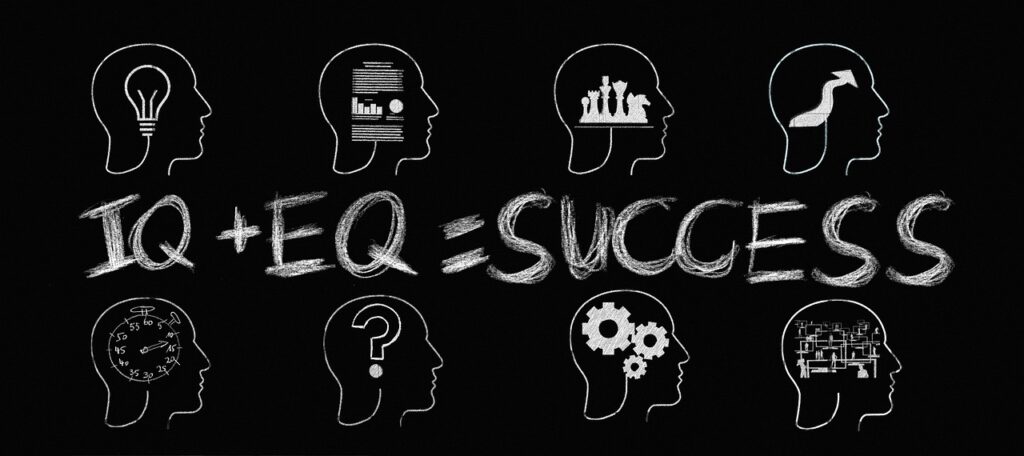You may not realize it, but emotional intelligence has a significant impact on both the workplace and your job search. More than just being good at your job, emotional intelligence refers to your ability to understand and manage your own emotions, as well as recognize and empathize with the emotions of others. In the workplace, emotional intelligence can improve your relationships with colleagues, enhance your communication skills, and even boost your leadership potential. When it comes to your job search, employers are increasingly recognizing the value of emotional intelligence, as it indicates your ability to work effectively with others and adapt to various situations. So, whether you’re already a part of the workforce or on the hunt for a new job, understanding and improving your emotional intelligence can greatly benefit your career success. Emotional intelligence plays a crucial role in both the workplace and job search. It encompasses the ability to recognize and manage our own emotions, as well as understand and respond to the emotions of others. By harnessing emotional intelligence skills, individuals can navigate workplace relationships, communicate effectively, enhance teamwork and collaboration, resolve conflicts, manage stress and emotions, and ultimately, excel in their careers.

Managing Workplace Relationships
Effective workplace relationships are built on emotional intelligence. By developing self-awareness and recognizing our emotions, we can better understand how they influence our interactions with colleagues. Additionally, by being socially aware, we can pick up on the emotions of others and tailor our communication and behavior accordingly, fostering positive and productive relationships.
Improving Communication
Communication is the cornerstone of any successful workplace. Emotional intelligence equips individuals with the skills to express themselves clearly, actively listen to others, and empathize with different perspectives. By understanding and addressing the emotions underlying communication, misunderstandings and conflicts can be avoided, and collaboration can flourish.
Enhancing Teamwork and Collaboration
Emotional intelligence plays a vital role in fostering teamwork and collaboration. By being aware of one’s own strengths and weaknesses, individuals can effectively contribute to a team and leverage the strengths of others. Additionally, emotional intelligence allows for the establishment of a supportive and inclusive team environment, where empathy and cooperation thrive.
Resolving Conflicts
Conflicts are inevitable in any workplace setting, but emotional intelligence can help navigate and resolve them effectively. By managing emotions and engaging in open, honest, and respectful communication, conflicts can be addressed in a constructive manner. Emotional intelligence also enables individuals to understand the perspectives and needs of others, facilitating compromise and finding mutually beneficial solutions.
Managing Stress and Emotions
The ability to manage stress and emotions is crucial for maintaining well-being and productivity in the workplace. Emotional intelligence enables individuals to recognize and regulate their own emotions, preventing them from negatively impacting their performance and relationships. By employing techniques such as mindfulness and emotional regulation, individuals can effectively cope with stress and maintain a positive and resilient mindset.
Building a Strong Resume and Cover Letter
Emotional intelligence is not only relevant within the workplace but also in the job search process. When constructing a resume and cover letter, emotional intelligence can be demonstrated through the choice of words, tone, and overall presentation. By showcasing self-awareness, adaptability, and effective communication skills, individuals can make a strong impression on potential employers.
Nailing the Job Interview
During a job interview, emotional intelligence plays a significant role in portraying one’s suitability for a position. By demonstrating self-confidence without arrogance, active listening skills, and the ability to engage and establish rapport with the interviewer, candidates with high emotional intelligence are more likely to stand out from the competition.

Building Rapport with Hiring Managers
Building rapport with hiring managers is important as it helps create a connection that goes beyond a candidate’s qualifications. Emotional intelligence allows individuals to understand the emotions and motivations of the hiring manager, enabling them to tailor their communication and build a genuine connection. This connection can greatly impact the hiring manager’s perception of the candidate and influence their decision-making process.
Showing Professionalism and Adaptability
In the job search process, emotional intelligence is crucial for demonstrating professionalism and adaptability. By managing their emotions and responding appropriately to challenging situations, individuals can showcase their ability to handle pressure and navigate different work environments. Demonstrating a willingness to learn, adapt, and collaborate can create a positive impression on potential employers.
Handling Rejections
Job rejections can be disheartening, but emotional intelligence helps individuals handle them in a constructive manner. By acknowledging and processing their emotions, individuals can maintain a positive mindset and continue to pursue other opportunities. Emotional intelligence also allows individuals to seek feedback and learn from the experience, enabling personal growth and development.
Building Stronger Relationships
Emotional intelligence in the workplace and job search contributes to building stronger relationships. By understanding and managing emotions effectively, individuals can establish trust, respect, and open lines of communication with colleagues, superiors, and potential employers. These relationships form the foundation for collaboration, support, and career growth.
Success in Teamwork and Collaboration
Emotional intelligence is essential for successful teamwork and collaboration. By recognizing and valuing the emotions and perspectives of team members, individuals can foster a collaborative and inclusive environment. The ability to empathize, communicate effectively, and manage conflicts contributes to better teamwork, increased productivity, and the achievement of shared goals.
Effective Conflict Resolution
Emotional intelligence plays a critical role in effectively resolving conflicts. By understanding one’s own emotions and those of others, individuals can approach conflicts with empathy and understanding. Emotional intelligence enables individuals to communicate assertively yet respectfully and to seek mutually beneficial solutions, resulting in improved working relationships and a more harmonious work environment.
Improved Job Performance and Productivity
Emotional intelligence positively impacts job performance and productivity. By managing emotions and stress, individuals can maintain focus, make better decisions, and adapt to changing circumstances. Effective communication and the ability to understand and respond to the emotions of others foster collaboration and teamwork, leading to increased productivity and overall job satisfaction.

Increased Career Opportunities
Emotional intelligence opens up new career opportunities. Employers recognize the value of emotional intelligence in navigating complex professional relationships and leading teams effectively. Individuals with high emotional intelligence are often sought after for leadership roles, as they can inspire and motivate others, adapt to new environments, and build strong networks.
Self-Awareness
Self-awareness is a crucial component of emotional intelligence. It involves recognizing and understanding one’s own emotions, strengths, weaknesses, and triggers. By cultivating self-awareness, individuals can better manage their emotions and behaviors, make informed decisions, and continuously grow and improve.
Self-Management
Self-management is the ability to regulate and control one’s emotions and behaviors. It involves practicing self-discipline, managing stress, and adapting to changing circumstances. By developing self-management skills, individuals can remain calm and focused, even in challenging situations, and effectively navigate the workplace environment.
Social Awareness
Social awareness involves understanding and empathizing with the emotions and needs of others. It includes being attentive to non-verbal cues, recognizing social dynamics, and demonstrating empathy. By cultivating social awareness, individuals can develop stronger relationships, communicate more effectively, and contribute positively to the work environment.
Relationship Management
Relationship management is about building and maintaining positive and productive relationships with others. It involves effective communication, conflict resolution, and collaboration. By developing relationship management skills, individuals can foster teamwork, inspire trust, and create a supportive and inclusive work environment.
Practicing Mindfulness and Emotional Regulation
Mindfulness and emotional regulation techniques are valuable tools for improving emotional intelligence. Mindfulness involves being present in the moment, non-judgmentally observing one’s thoughts and emotions. Emotional regulation involves recognizing and managing one’s emotions in a healthy and constructive manner. By practicing these techniques, individuals can better understand and control their emotions, leading to improved self-awareness and effective communication.
Improving Active Listening Skills
Active listening is a key component of emotional intelligence. It involves fully engaging with the speaker, paying attention to verbal and non-verbal cues, and demonstrating empathy. By actively listening, individuals can foster a deeper understanding of others’ perspectives, build stronger relationships, and communicate more effectively.

Developing Empathy and Perspective-Taking
Empathy and perspective-taking are essential for emotional intelligence. Empathy involves understanding and sharing the emotions of others, while perspective-taking involves putting oneself in another person’s shoes to understand their point of view. By developing empathy and perspective-taking skills, individuals can build stronger relationships, demonstrate compassion, and communicate with sensitivity and understanding.
Building Emotional Resilience
Emotional resilience is the ability to bounce back from setbacks and adapt to challenges. It involves managing stress, maintaining a positive mindset, and seeking support when needed. By building emotional resilience, individuals can navigate the ups and downs of the workplace and job search, maintaining productivity, and well-being.
Seeking Feedback and Continuous Growth
Seeking feedback and actively pursuing continuous growth is essential for developing emotional intelligence. By seeking feedback from colleagues, supervisors, and mentors, individuals can gain valuable insights into their strengths and areas for improvement. Continuous growth involves being open to learning opportunities, reflecting on experiences, and actively working on developing emotional intelligence skills.
Using Self-Assessment Tools
Self-assessment tools can aid in assessing emotional intelligence in the workplace. These tools often involve questionnaires or assessments that measure various aspects of emotional intelligence, such as self-awareness, empathy, and relationship management. By using self-assessment tools, individuals can gain a better understanding of their emotional intelligence strengths and areas for development.
Observing Behavior and Interactions
Observing behavior and interactions is a valuable way to assess emotional intelligence. By paying attention to how individuals manage their emotions, communicate with others, and handle conflicts, their level of emotional intelligence can be observed. This can be done through formal or informal observation, allowing for a better understanding of emotional intelligence in action.
Conducting Emotional Intelligence Tests
Emotional intelligence tests can provide a more in-depth assessment of an individual’s emotional intelligence. These tests typically involve a series of scenarios or questions that measure emotional intelligence competencies and provide a score or assessment report. Conducting emotional intelligence tests can offer valuable insights into an individual’s strengths and areas for development.
Evaluating Emotional Intelligence during the Hiring Process
Evaluating emotional intelligence during the hiring process can be done through various methods. This can include assessing how candidates communicate, respond to interview questions, and interact with others during group exercises or simulations. By including emotional intelligence in the hiring process, employers can select candidates who possess the necessary skills to excel in the workplace.

Seeking Feedback from Peers and Supervisors
Feedback from peers and supervisors is an effective method for assessing emotional intelligence. By soliciting feedback, individuals can gain insights into how their emotions and behavior impact others. Constructive feedback allows individuals to identify areas for improvement and make necessary changes to strengthen their emotional intelligence skills.
Emotional Baggage and Past Experiences
Emotional baggage and past experiences can pose challenges to developing emotional intelligence. Negative experiences or unresolved emotions can affect how individuals perceive and respond to situations, potentially hindering their ability to manage emotions and build relationships. It is important to recognize and address these challenges through self-reflection, therapy, or other techniques to promote emotional growth.
Resistance to Change and Self-Reflection
Resistance to change and self-reflection can impede the development of emotional intelligence. Some individuals may struggle with acknowledging their emotions, taking responsibility for their actions, or embracing new approaches to managing relationships. Overcoming resistance to change and prioritizing self-reflection is crucial for personal and professional growth.
Lack of Awareness and Self-Management Skills
A lack of awareness and self-management skills can be a barrier to developing emotional intelligence. Some individuals may struggle to recognize and understand their own emotions or have difficulty regulating their reactions. Developing awareness and practicing self-management techniques, such as deep breathing or journaling, can help overcome these barriers.
Organizational Culture and Leadership Style
Organizational culture and leadership style can impact the development of emotional intelligence. If the culture emphasizes individualism, competition, or lacks emotional support, it can hinder the growth of emotional intelligence. Similarly, leadership styles that are authoritarian or lack empathy can inhibit the development of emotional intelligence within an organization. Recognizing and addressing these cultural and leadership factors is crucial for fostering emotional intelligence.
Time and Resource Constraints
Time and resource constraints can make it challenging to prioritize the development of emotional intelligence. Individuals may struggle to find the time or resources to invest in self-reflection, training programs, or therapy. However, incorporating small changes and seeking opportunities for growth, such as leveraging online resources or participating in peer support groups, can help overcome these constraints.
Company-Sponsored Training Workshops
Company-sponsored training workshops are a valuable resource for developing emotional intelligence. These workshops can provide employees with the knowledge, skills, and strategies needed to enhance their emotional intelligence. By offering these workshops, organizations demonstrate their commitment to fostering a positive and emotionally intelligent workplace culture.
Executive Coaching and Mentoring
Executive coaching and mentoring programs can support individuals in developing their emotional intelligence. Coaches and mentors provide personalized guidance, feedback, and support, facilitating the acquisition and application of emotional intelligence skills. This one-on-one approach can be particularly effective in addressing specific challenges and fostering growth.
External Emotional Intelligence Programs
External emotional intelligence programs offer comprehensive training and development opportunities. These programs often provide a structured curriculum, assessments, and ongoing support to enhance emotional intelligence skills. Employees can benefit from the expertise and guidance of external facilitators, gaining new insights and strategies to apply in the workplace.
Online Courses and Resources
Online courses and resources provide accessible and flexible options for developing emotional intelligence. There are numerous online platforms offering courses, webinars, and resources focused on emotional intelligence. Individuals can explore these options at their own pace and from the comfort of their own homes, making continuous learning and growth more attainable.
Peer Learning and Support Groups
Peer learning and support groups offer opportunities for individuals to learn from and support each other in developing emotional intelligence. These groups provide a safe and collaborative space to share experiences, perspectives, and strategies for growth. Peer learning and support groups can be organized within the workplace or through external networks.
Building Trust and Inspiring Others
Emotional intelligence plays a vital role in leadership. Leaders with high emotional intelligence can build trust amongst their team members by demonstrating authenticity, empathy, and consistency. By inspiring others through effective communication, active listening, and genuine care, leaders with emotional intelligence can foster a positive work environment and drive team success.
Effective Decision-Making
Emotional intelligence contributes to effective decision-making in leadership roles. Leaders with emotional intelligence can consider the emotions and perspectives of team members, weigh the potential impact of decisions, and make informed choices. This holistic approach ensures that decisions are fair, balanced, and take into account the emotions and needs of all stakeholders.
Leading with Empathy and Compassion
Leading with empathy and compassion is a hallmark of emotionally intelligent leadership. By understanding and valuing the emotions and experiences of team members, leaders can create a supportive and inclusive work environment. Empathetic and compassionate leaders inspire trust, foster collaboration, and help individuals thrive both personally and professionally.
Managing Change and Resilience
Emotional intelligence is crucial for managing change and fostering resilience in leadership roles. Leaders with emotional intelligence can navigate change by acknowledging and addressing the emotions of team members, providing support, and effectively communicating the vision and benefits of change. Additionally, emotionally intelligent leaders can demonstrate resilience and adaptability, inspiring others to do the same.
Creating a Positive Work Environment
Emotionally intelligent leaders have the power to create a positive work environment. Through their actions, words, and behavior, they set the tone for the workplace culture. By promoting open communication, empathy, and appreciation, emotionally intelligent leaders cultivate an environment where individuals feel valued and motivated to contribute their best.
In conclusion, emotional intelligence plays a critical role in both the workplace and job search. From managing workplace relationships to resolving conflicts, emotional intelligence skills are essential for success. By developing self-awareness, self-management, social awareness, and relationship management skills, individuals can enhance their emotional intelligence. Practicing mindfulness, improving active listening skills, developing empathy, and seeking feedback are tools and techniques that can aid in improving emotional intelligence. Moreover, assessing emotional intelligence through self-assessment tools, behavior observation, and emotional intelligence tests can provide valuable insights. While challenges and barriers may arise, various training and development programs are available to support the growth of emotional intelligence. Ultimately, emotional intelligence is a key factor in effective leadership, helping to build trust, inspire others, promote effective decision-making, and create a positive work environment. By prioritizing emotional intelligence, individuals can enhance their career opportunities and thrive in the workplace.



